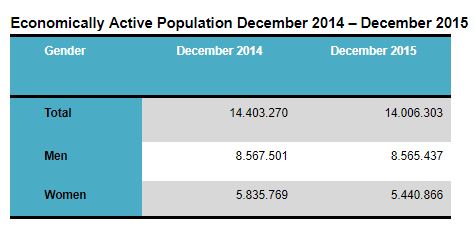Women’s Rights in Venezuela: a Hypocritical Mirage Called “Feminist Revolution”
On International Women’s Day, we examine chavismo calling themselves feminists. It’s like when they call themselves humanitarians: an outright lie.


Photo: Su Noticiero
“Feminist.” That’s is how Hugo Chávez declared himself and his Bolivarian revolution. Nicolás Maduro followed his example.
But what would you say if I told you there’s a severe contraceptive, condom and sanitary pad shortage, and that the few products available are so expensive that the vast majority of women can’t afford them?
Would you call “feminist” a government that, in almost two decades, has done nothing to guarantee women’s political participation and economic independence?
Would you consider as “feminist” a regime that allows a 66% increase in maternal mortality a year, remains silent around issues like abortion, and exhibits the second highest teenage pregnancy rate in Latin America and the Caribbean?
You may think I’m exaggerating. I’m not.
According to official figures cited in Mujeres al Límite, for every 100 men who lived in poverty during chavismo, there were 107 women; for every 100 men living in extreme poverty, there were 112 women; 4 of 10 households are headed by a female; 99.48% of those who ceased to be economically active between December 2014 and December 2015 were women: they’re the first to leave the labor market to either line up for hours in front of supermarkets, look after others or search for medicines. Many enter the informal sector, where they can combine work and family, but lack social protection and are vulnerable to exploitation and health risks.

Source: Instituto Nacional de Estadística, INE. Labour Force Indicators.
Women’s share in Parliament is only 20%, below regional and world averages, and Maduro’s cabinet is far from the 50/50 a feminist government could brag about. Of 31 cabinet ministries, only four are headed by women.
It’s been 19 years since Chávez’ Bolivarian political project came to power on a platform that promised deep transformations and social justice. Issues of gender equality made it to the highest levels of political discourse and became omnipresent in the government’s narrative, only to be later used in an increasingly manipulative and deceptive manner, mostly subordinated to the regime’s political and ideological agenda.
Thus, the feminist revolution is no more than an illusion.
Chavismo’s brand of feminism puts forward the idea that gender equality is only possible in a socialist state. So, dismantling capitalist structures would be a precondition for bridging the gender gap.
Now, we could argue at length about capitalism’s many flaws and its impact on societies’ most vulnerable demographics. But there’s no evidence that a socialist state would guarantee gender equality; the argument ignores that patriarchy predates capitalism and its origin has to do with asymmetrical power relations between men and women, regardless of capital or means of production controlled by private or public hands.
They’re the first to leave the labor market to either line up for hours in front of supermarkets, look after others or search for medicines.
The accent of all the government’s actions is not on empowering women, then; or on reaching gender equality; it’s on getting women to work along political and ideological lines, to establish a socialist state. It’s a well-known fact that many of the government-sponsored local participation structures, including the infamous Comités Locales de Abastecimiento y Producción, or CLAPS, are comprised mostly by women.
And instead of challenging women’s traditional role in society —something one would expect a feminist government to do— the official discourse reinforces and promotes a vision of women as child bearers and caregivers, not as students, researchers, entrepreneurs or scientists. The government’s approach on women issues is asistencialista, fostering dependence on a State that tacitly demands subordination and passivity.
Venezuelan women got to this International Women’s Day more vulnerable than ever before to poverty, violence, hunger, malnutrition and poor health. All this, thanks to a combination of political-ideological bias, incompetence and negligence, in the context of the serious humanitarian emergency Venezuela is facing.
So next time you hear that Venezuela’s revolution is feminist, you know it’s simply not true.
A longer version of this article was published in Women Across Frontiers.
***
Update: A previous version of this post stated “99.48% of those who lost their jobs between December 2014 and December 2015 were women”, just like it was reported in Mujeres al Límite. However, the numbers actually show that “99.48% of the those who ceased to be economically active between December 2014 and December 2015 were women”. The update was approved by the author of this post.
Caracas Chronicles is 100% reader-supported.
We’ve been able to hang on for 22 years in one of the craziest media landscapes in the world. We’ve seen different media outlets in Venezuela (and abroad) closing shop, something we’re looking to avoid at all costs. Your collaboration goes a long way in helping us weather the storm.
Donate




